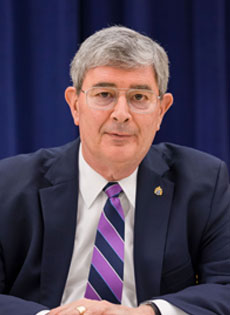
Dear Father: Please stop it
Monday, December 12, 2016
George Weigel
In all the 16 documents of the Second Vatican Council, is there any prescription more regularly violated than General Norm 22.3 of the Constitution on the Sacred Liturgy? Which, in case you’ve forgotten, teaches that “no….person, not even a priest, may add, remove, or change anything in the liturgy on his own authority.”
If you’re a daily Mass attendant, the odds are that you hear that norm violated a dozen times a week. Sunday Mass people typically hear it violated two or three times a week, at least. Auto-editing or flat-out rewriting the prescribed text of the Mass is virtually epidemic among priests who attended seminary in the late ‘60s, ‘70s, or early ‘80s; it’s less obvious among the younger clergy. But whether indulged by old, middle-aged, or young, it’s obnoxious and it’s an obstacle to prayer.
Especially now, I might note, given the restoration of the more formal rhythms of liturgical language in the English translations we’ve used since Advent 2011. Those translations are not faultless. But they’re a massive improvement on what we used to have (as a comparison with what’s still, alas, in the breviary will attest). And by restoring sacral language that was peremptorily discarded in the previous translation, the current translation reminds us that Mass is far more than a social gathering; it’s an act of worship, the majesty of which should be reflected in the language of the liturgy — which is not the language of the shopping mall or the Super Bowl party.
In one sense, though, the new translation has made things worse. For when Father Freelance scratches his itch to show just how congregation-friendly he is by making what he imagines are nifty changes to the Mass text, he instantly sets up sonic dissonance for anyone with a reasonably well-tuned ear. And sonic dissonance makes it hard to pray.
So may I suggest to our fathers in Christ that they cease and desist from making it up, juicing it up, or otherwise tinkering with the Missal? As an old liturgical saw has it, referring to the difference in color that distinguishes prayers from instructions in the Missal, “Read the black and do the red.” Just that, Father. Read the black and do the red. Or, better, pray the black and do the red.
Such self-discipline on the part of celebrants would also help eliminate the clericalism (and worse) involved when Father Freelance, well, free-lances. For in metaphorically thumbing his nose at the Council’s clear injunction (not to mention the rubrics in the Missal), Father Freelance is de facto asserting his own superiority over the liturgy. And in doing so, he is, whether he intends it or not, downgrading the congregation’s role in offering right worship to the Thrice-Holy God.
In a properly celebrated Mass, the vocalized dialogue of prayer between celebrant and congregation takes place in a linguistic rhythm established by the shared text of the Mass. And that rhythm is broken when, to take one example that’s grated on me recently, the celebrant announces the Gospel reading by saying, “The Good News of the Lord as proclaimed by Luke.” To which the expected response, “Glory to you, O Lord,” sounds clunky, whereas it neatly answers the prescribed announcement, “A reading from the holy Gospel according to -----.”
It may come as a surprise to Father Freelance, but after more than four decades of priest-celebrants trying to be Johnny Carson, Bob Barker, Alex Trebek, or whomever, this act is getting very old. Father, you’re just not very good at it. Your freelancing is often banal, even silly. Moreover, you demean us by suggesting that we, the congregation, can’t handle the sacral language of the liturgy, and that we have to be jollied into participation. In fact, if you listen carefully, you’ll discover that congregational responses drop off when you invite a response in your terms, not the liturgy’s.
So please, fathers in Christ, spare us these attempts at creativity, or user-friendliness, or whatever it is you think you’re doing. They just don’t work. Please just pray the black and do the red. And the worship Vatican II intended will be much enhanced thereby.


Comments from readers